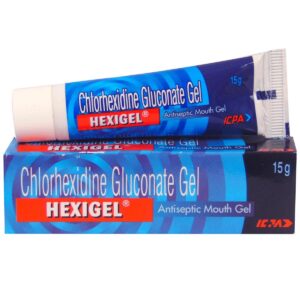CHLORHEXIDINE + NOT AVAILABLE + OTHER OROPHARYNEAL
Chlorhexidine: Chlorhexidine is an antiseptic and disinfectant medication that is commonly used to clean and disinfect the skin before surgery or invasive procedures. It is also used to clean and disinfect wounds, mouthwash, and to prevent infections in various medical settings.
The drug works by binding to the cell membranes of microorganisms, disrupting their structure and inhibiting their growth. It has broad-spectrum activity against both Gram-positive and Gram-negative bacteria, as well as fungi and viruses. Unlike other antiseptics, chlorhexidine has a residual effect, meaning it continues to work after application and provides some ongoing protection against pathogens.
Chlorhexidine comes in various forms, including solutions, gels, and sprays, depending on the intended use. The concentration of the drug varies depending on the application, with concentrations ranging from 0.2% to 4%. It is typically applied topically to the skin or mucous membranes, and in some cases, it can be used as a mouthwash or gargle.
The recommended dose and frequency of use depend on the specific indication and the concentration of the chlorhexidine product being used. It is important to carefully follow the instructions provided by the healthcare professional or the product label.
Common side effects of chlorhexidine use include skin irritation, redness, and allergic reactions. It may cause a burning or stinging sensation when applied to sensitive areas. Prolonged or repeated use may cause the skin or mucous membranes to become discolored or stained. In some rare cases, chlorhexidine may cause severe allergic reactions or anaphylaxis.
It is important to note that chlorhexidine should not be ingested or used in large quantities, as it can be toxic if swallowed. It should also not be used in the eyes or ears unless specifically directed by a healthcare professional.
As with any medication, it is recommended to consult with a healthcare provider or pharmacist before using chlorhexidine to ensure its appropriate and safe use.
Not Available: I’m sorry, but I cannot provide information about a drug that is not available. It’s important to consult with a healthcare professional or a pharmacist to get accurate information about specific drugs. They can provide you with the necessary details on drug use, mechanism of action, dosage, and potential side effects for any specific medication.
Other Oropharyneal: I’m sorry, but “Other Oropharyneal” does not appear to be a specific drug name. However, I can give you general information about drugs used for oropharyngeal conditions. Please let me know if you have a specific drug in mind or if you would like general information about oropharyngeal medications.

